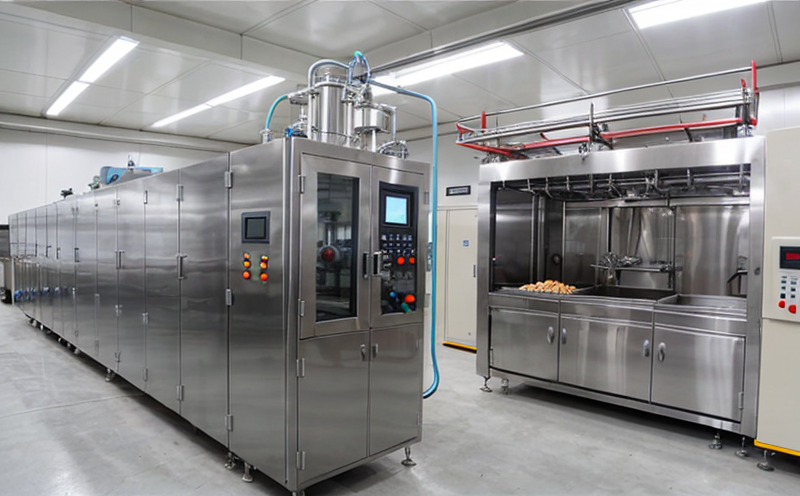
-
Industrial Equipment Certification-
Manufacturing Equipment Certification-
Certification for Food Processing Equipment
We provide comprehensive solutions designed to help our clients mitigate risks, enhance performance, and excel in key areas such as quality, health & safety, environmental sustainability, and social responsibility.
Discover
For many years, our organization has been operating successfully, boasting modern laboratories that meet international standards. These laboratories are equipped with the latest technology devices and equipment, and we have built a strong team of experienced and trained personnel to operate them.
DiscoverWelcome to Eurolab, your partner in pioneering solutions that encompass every facet of life. We are committed to delivering comprehensive Assurance, Testing, Inspection, and Certification services, empowering our global clientele with the ultimate confidence in their products and processes.
Discover
-
Industrial Equipment Certification-
Manufacturing Equipment Certification-
Certification for Food Processing EquipmentCertification for Food Processing Equipment: Ensuring Safety and Compliance
In todays food processing industry, certification has become a crucial aspect of ensuring that equipment meets the required safety standards and complies with regulatory requirements. With an increasing focus on consumer protection, governments around the world have implemented strict regulations to guarantee that food products are processed in a safe and hygienic environment.
What is Certification?
Certification is the process of verifying that a product or equipment meets specific standards or regulations. In the context of food processing equipment, certification ensures that machines are designed and manufactured with safety features that prevent contamination, reduce the risk of foodborne illnesses, and meet environmental sustainability requirements.
Importance of Certification for Food Processing Equipment
Certification plays a vital role in maintaining public health and confidence in the food supply chain. By ensuring that equipment meets specific standards, certification:
All food processing equipment, including heat exchangers, milling machines, pasteurizers, and more.
2. How long is a certification valid?
Certification periods typically range from 3-5 years, depending on the scheme and governing body.
3. What are the benefits of certification for manufacturers or suppliers?
Improved brand reputation, increased market competitiveness, reduced liability risks, compliance with industry standards, and enhanced revenue opportunities through export markets.
4. Can I certify my equipment in-house?
No, certification requires an independent third-party evaluation to maintain objectivity and ensure compliance with relevant standards.
5. What is the cost of certification?
Costs vary depending on the scheme, governing body, and specific requirements for each piece of equipment.
6. How often do I need to perform surveillance activities?
Manufacturers or suppliers typically require regular maintenance and surveillance activities to ensure continued compliance with certification schemes.
In conclusion, certification is a crucial aspect of ensuring that food processing equipment meets required safety standards and complies with regulatory requirements. Manufacturers, suppliers, and consumers must understand the importance of certification and adhere to relevant standards to maintain public health and confidence in the food supply chain.

Military Equipment Standards
Military Equipment Standards: Ensuring Effectiveness and Safety The use of military equipment is a ...

Transportation and Logistics Certification
Transportation and Logistics Certification: A Comprehensive Guide The transportation and logistics ...

Lighting and Optical Device Testing
Lighting and Optical Device Testing: Ensuring Performance and Safety Lighting and optical devices a...

Hospitality and Tourism Certification
Hospitality and Tourism Certification: Unlocking Opportunities in the Industry The hospitality and ...

IT and Data Center Certification
IT and Data Center Certification: Understanding the Importance and Benefits The field of Informatio...

Industrial Equipment Certification
Industrial equipment certification is a critical process that ensures industrial equipment meets spe...

MDR Testing and Compliance
MDR Testing and Compliance: A Comprehensive Guide The Medical Device Regulation (MDR) is a comprehe...

Fire Safety and Prevention Standards
Fire Safety and Prevention Standards: Protecting Lives and Property Fire safety and prevention stan...

Consumer Product Safety
Consumer Product Safety: Protecting Consumers from Harmful Products As a consumer, you have the rig...

Electrical and Electromagnetic Testing
Electrical and Electromagnetic Testing: A Comprehensive Guide Introduction Electrical and electrom...

Cosmetic Product Testing
The Complex World of Cosmetic Product Testing The cosmetics industry is a multi-billion-dollar ma...

Product and Retail Standards
Product and Retail Standards: Ensuring Quality and Safety for Consumers In todays competitive marke...

Railway Industry Compliance
Railway Industry Compliance: Ensuring Safety and Efficiency The railway industry is a critical comp...

Environmental Simulation Testing
Environmental Simulation Testing: A Comprehensive Guide In todays world, where technology is rapidl...

Agricultural Equipment Certification
Agricultural equipment certification is a process that ensures agricultural machinery meets specific...

Construction and Engineering Compliance
Construction and Engineering Compliance: Ensuring Safety, Quality, and Regulatory Adherence In the ...

Electromechanical Safety Certification
Electromechanical Safety Certification: Ensuring Compliance and Protecting Lives In todays intercon...

Food Safety and Testing
Food Safety and Testing: Ensuring the Quality of Our Food As consumers, we expect our food to be sa...

Pressure Vessels and Installations Testing
Pressure Vessels and Installations Testing Pressure vessels are a critical component of various ind...

Battery Testing and Safety
Battery Testing and Safety: A Comprehensive Guide As technology continues to advance, battery-power...

NEBS and Telecommunication Standards
Network Equipment Building System (NEBS) and Telecommunication Standards The Network Equipment Bu...

Trade and Government Regulations
Trade and government regulations play a vital role in shaping the global economy. These regulations ...

Healthcare and Medical Devices
The Evolution of Healthcare and Medical Devices: Trends, Innovations, and Challenges The healthcare...

Chemical Safety and Certification
Chemical safety and certification are critical in ensuring the safe management of products and proce...

Environmental Impact Assessment
Environmental Impact Assessment: A Comprehensive Guide Environmental Impact Assessment (EIA) is a c...

Energy and Sustainability Standards
In today’s rapidly evolving world, businesses face increasing pressure to meet global energy a...

Automotive Compliance and Certification
Automotive Compliance and Certification: Ensuring Safety and Efficiency The automotive industry is ...

Pharmaceutical Compliance
Pharmaceutical compliance refers to the adherence of pharmaceutical companies and organizations to l...

Renewable Energy Testing and Standards
Renewable Energy Testing and Standards: Ensuring a Sustainable Future The world is rapidly transiti...

Aviation and Aerospace Testing
Aviation and Aerospace Testing: Ensuring Safety and Efficiency The aviation and aerospace industr...